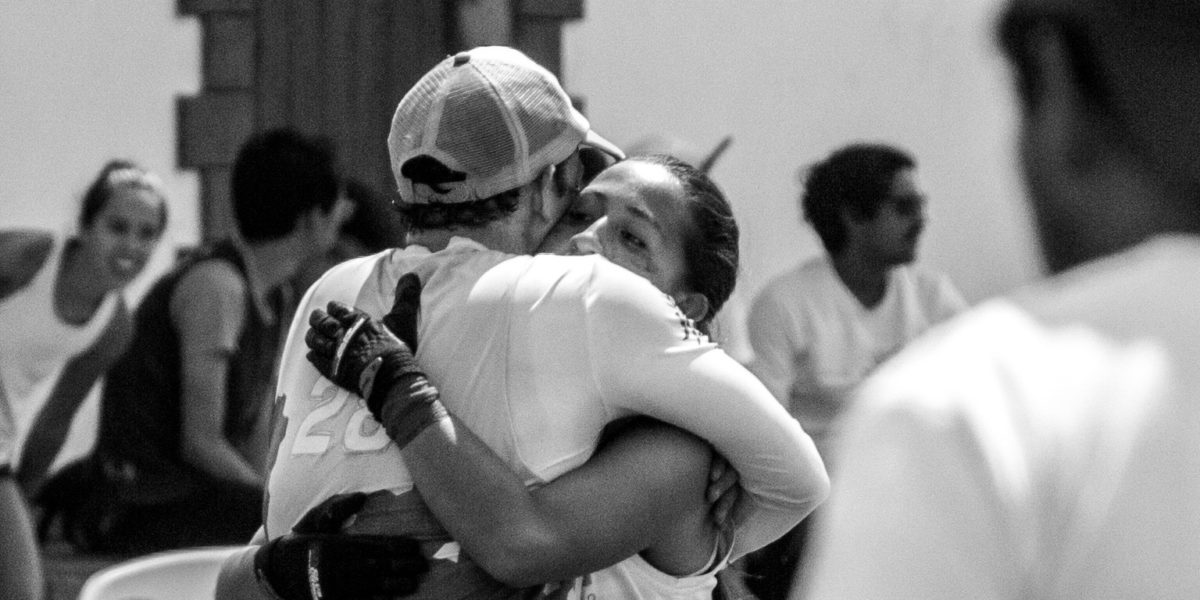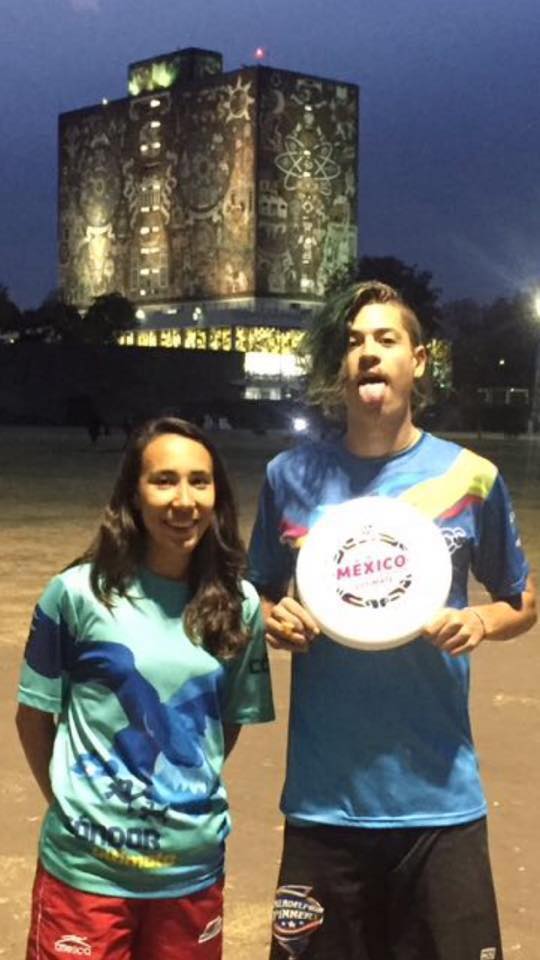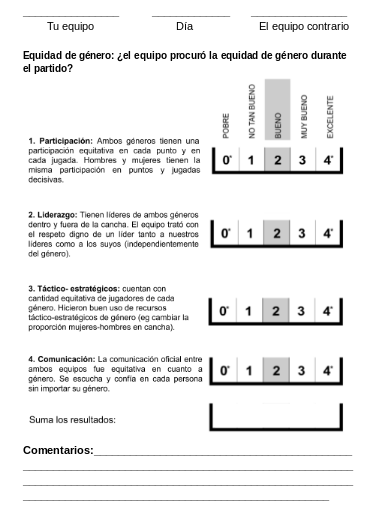 Photo by Adriana Gutiérrez
Photo by Adriana Gutiérrez
Our story begins in the 2017 Panamerican Ultimate Club Championships (PAUCC) in Buenos Aires, Argentina, where our Mexico City club Cóndor Ultimate, competed in its first international tournament. At the tournament, my teammate Dani and I attended a particularly eye-opening conference about gender equity in mixed ultimate. At this conference, we realized the Mexican scene seemed so far behind compared to the international representations we witnessed at PAUCC. This stirred a feeling of urgency in us and made us more determined to work seriously on the issue, which led to a profound exploration of Spirit of the Game and a vanguard endeavour for gender equity in Mexican Ultimate.
Dani and I had the opportunity to get to know each other better as we wandered the picturesque streets of Buenos Aires and debriefed on the frustrating experience we had competing at PAUCC with our mixed team. Questions like “What did you think of the tournament? What would you like to change within our team? How would you compare mixed to men’s and women’s divisions? Where do you think the Mexican ultimate scene is going?” These became natural conversation starters throughout the remainder of the trip. We realized we saw eye to eye on many of these topics. The confluence of ideas, as well as the fervor of our frustrations, was too deep to remain as mere bystanders.

Shortly after we got back home to Mexico, Dani proposed that she and I become Spirit captains for the upcoming mixed season with the explicit objective of addressing gender issues and striving for equity from that position. We were beginning to play with the idea that SotG could be leveraged as a tool for social transformation and we felt it worthy to apply it to the gender narratives we had lived in ultimate, so I was very glad to accept Dani’s proposal.
Deeply inspired by the global movement being lead by the likes of GUM and EMU, we started holding conversations with Cóndor about equity in the mixed division. During these sessions we addressed questions like, “What is gender? What is equity? What does gender equity look like in ultimate? What actions can we take to work towards equity in our own team?”
One of the primary insights we reached in these team conversations is one that Dani and I had already chatted about: Gender oppression (namely, the patriarchy) is not unique or intrinsic to Cóndor’s culture. Rather, we are merely a subset within a broader social environment that already has established culture, norms, and practices. Machismo runs deep in our ultimate scene because it runs deep in our society and vice versa.
Sports in Mexico are not only male-dominated in general, they are a breeding ground for toxic masculinity narratives. While some communities in other parts of the Ultimate World were already leading inspiring ventures of empowerment, our team was still using phrases like “don’t throw like a girl” or “grow some balls” in time-out team huddles at tournaments. Building a healthy and successful mixed team in this noxious cultural context can be incredibly challenging. Several toxic macho behaviors become more highlighted, normalized, and even excused by the pressure of competition, making ultimate a space where the dynamics of oppression not only get played out, but actually get further perpetuated. These mutually reinforcing patterns create a system of self-replicating harm — a vicious cycle that can seem impossible to break out of.
If Dani and I wanted to see a structural change in our environment, we needed to take it further than just talking inside our team and had to start working with the Mexican ultimate scene at large. So the next natural step was taking the conversation to tournaments for the Mexican ultimate community to address its gender issues.
At the time it occurred to us that to start conversations at tournaments we could add gender equity as a sixth pillar to be evaluated in the Spirit scoring sheets, since it is common practice to discuss scores in Spirit circles here in Mexico. We thought that evaluating the other team’s gender dynamics would detonate an exercise of observation, reflection, dialogue and perhaps eventually action on the matter. This experiment was the main idea we invested our time and effort in for the entirety of the mixed season, and we persisted developing and refining the proposal throughout the following months.
 For the first tournament of the year, we included in the tournament’s manual a set of examples for every grade (0-4) in the gender equity pillar following WFDF’s format for the 5 original pillars. We also wrote and printed out a complementary text to introduce the experiment, including a brief definition of gender equity. It offered a general overview of the proposal and its objectives, encouraging players to take it seriously while also stressing the experimental nature of it and openly inviting feedback. We tried to go over these materials to clear doubts in a poorly attended Spirit Captains meeting at the start of the tournament. Those who received the add-on to the scoring sheet later were pretty confused about its origin and purpose. Some would easily trivialize it saying “it’s too complex to score.” We made it far too easy for people to dismiss it.
For the first tournament of the year, we included in the tournament’s manual a set of examples for every grade (0-4) in the gender equity pillar following WFDF’s format for the 5 original pillars. We also wrote and printed out a complementary text to introduce the experiment, including a brief definition of gender equity. It offered a general overview of the proposal and its objectives, encouraging players to take it seriously while also stressing the experimental nature of it and openly inviting feedback. We tried to go over these materials to clear doubts in a poorly attended Spirit Captains meeting at the start of the tournament. Those who received the add-on to the scoring sheet later were pretty confused about its origin and purpose. Some would easily trivialize it saying “it’s too complex to score.” We made it far too easy for people to dismiss it.
We tried to step up our game for the second tournament of the year, this one to be held out of state. We tried to emphasize the grassroots nature of the experiment and invited players to actively participate in the creation of this proposal appealing to the fact that it focuses on an issue that concerns our community as a whole. We shared all the materials with event participants and published on social media. We also scheduled a time slot during the tournament to hold a feedback conversation and improve the proposal. At first, only one person sitting nearby participated. After talking in circles for a little while, we encouraged a young team to join. As more and more players from other teams joined, participant interventions grew in variety and intensity until it became a challenge to keep the group focused on the experience with the scoring sheet. Despite Dani and my efforts that afternoon and later on social media, the apparent glimmer of interest evaporated shortly after everyone rode their bus back home. It was hard to ensure a follow-up to these tiny bursts of interest.
The National Championships came around and we wanted to end the season delivering a more polished, finalized product. With the help of Flor Aldatz, who is a member of WFDF’s Women in Sports Commission and a player in Argentina’s Actitud Pizza, Dani became inspired to divide the Gender Equity pillar into 4 categories that were more clearly defined: Players could no longer appeal to vagueness as a cop-out. Ultimate México (the governing body for the sport in the country) kindly granted financial support to have printed and laminated copies of all the materials for each competing team. We tried to be extra diligent about starting the conversation on social media in advance, checking in with the involved volunteers throughout the tournament, and seriously focusing on the topic during Spirit circles.
During certain Spirit circles, we had to remind the other team about the gender equity score, and we still had trouble ensuring all teams received handouts promptly throughout the tournament. At the end of the day, the community did not seem to take ownership of the proposal — the materials, the idea, or even the gender problem in itself. After genuine attempts to make the proposal clear, open, and accessible, it was largely met with indifference. This was also made explicit to us in the lowly responded evaluation survey we sent out afterwards.
It was a disappointment that the experiment didn’t lead to more concrete action on the matter. It did not end machismo in ultimate, sports, or anywhere else. After failing to transform Mexican ultimate, we were ready to drop the dream of “the 6th pillar” and stop insisting with the rubric.
***
Despite our disappointment, I do see some value in the possibility that the experiment catalyzed some important dialogues and deep reflections. We started many conversations that wouldn’t have taken place otherwise. Some conversations even lead to discomfort among players and teams, with several people trying to skip the rubric and evade the topic. I think this is an indicator of how urgent it is for us to address this collective problem. I hope some of that tension has been harvested and transformed, if not into action, then at least into some type of awareness by the Mexican ultimate community. After all, Spirit of the Game has been defined as, “mindful behavior by players before, during, and after a game of ultimate.”
Another silver lining that I like to highlight from this experience, is that it got me and Dani to reflect on Spirit and gender more thoroughly and constantly. I am certain that the experiment greatly shaped how I see gender, ultimate and Spirit of the Game. The experience with the rubric proposal triggered a series of profound revelations that have been snowballing in my head ever since. I’ve come to see Spirit of the Game as a praxis: a guiding philosophy and a set of actions or practices. Many of the tools of SotG (e.g. scoring, circles, captains, timeouts, etc.) seem to carry an implicit dialectic of action-reflection-action. We play, we talk about it, we play, and so on. These iterative feedback cycles serve to make us aware of what we need to improve on in a peer-to-peer fashion. When done well, these constant evaluations orient us to work on our challenges and deficiencies. These continuous feedback processes act as a self-regulation mechanism to keep our behavior in check and change it if necessary.
Additionally, I’ve come to realize that Spirit is an intrinsically social phenomenon. We apishly mirror our opponents’ kindness with more kindness. When we see another team do the right thing, we become inspired to cultivate that to flourish as well. Spirit seems to spread like spores with these feedback loops. Perhaps we can use these self-replicating cycles to out-power the toxic patterns of machismo we see in sports, media and culture in general. I believe that if Spirit were embodied in more spaces of our daily lives, we would have powerful tools to counter these vicious cycles with our very own virtuous ones.
The broad yet powerful definition of Spirit of the Game as “mindful behavior” and the fact that it is so wildly contagious makes me think of it as some type of collective consciousness — an emergent phenomenon that is as abstract as it is relatable, as simple as it is powerful. I like to think of social movements as emergent phenomena of that type as well: a collective paradigm shift with no one person instructing others, rather many individuals acting in a decentralized yet coordinated form to make a necessary change in their environment. These phenomena often grow and spiral beyond their original scope, causing a ripple effect that transforms their surrounding. I hope that the correlation I see is not merely coincidental and that it inspires many of us to keep working hard for profound systemic transformation.
***
We didn’t catalyze a radical revolution in Mexican ultimate with the “6th pillar” of Spirit of the Game, but the exploration of Gender Equity through SotG and Ultimate was far from finished. After nationals, we figured WUCC 2018 would be a great place to showcase our experiment. We were pleasantly surprised with how many people at the tournament were interested in hearing our story and wanted to see the materials we had created for the proposal.
We were honored to be featured among the finalists for the Ultimate Peace Global Spirit of the Game award due to our efforts for equity in the Mexican mixed division. Hearing other people’s stories and experiences on how they incorporate ultimate and Spirit into their daily lives and work for social justice was deeply inspiring. This reaffirmed our desire to stick with the idea of SotG as a powerful and necessary tool for social transformation, particularly focused on gender.
While we did not win the prestigious award, we did become ambassadors for Ultimate Peace. We want to honor this title by continuing our work towards equity in mixed ultimate, no longer just through scoring, rather developing a new project that is more structured. We want to grow our core team and hold spirit clinics, workshops, and other activities around gender in sports and ultimate specifically. We would especially love to work with young people, since a new generation of players is rising in Mexico, and we believe youth to be the motor for change in any community. We will make sure to pass on the discs that were kindly gifted to us by Ultimate Peace with the hopes of spreading them as spores of change.
At the end of the day, our experiment didn’t cause the massive ripple effect we dreamt of, but it helped plant a seed in our minds and in our ultimate community. A new way of understanding Spirit and an exciting new ultimate project are brewing in Mexico City.









Comments Policy: At Skyd, we value all legitimate contributions to the discussion of ultimate. However, please ensure your input is respectful. Hateful, slanderous, or disrespectful comments will be deleted. For grammatical, factual, and typographic errors, instead of leaving a comment, please e-mail our editors directly at editors [at] skydmagazine.com.